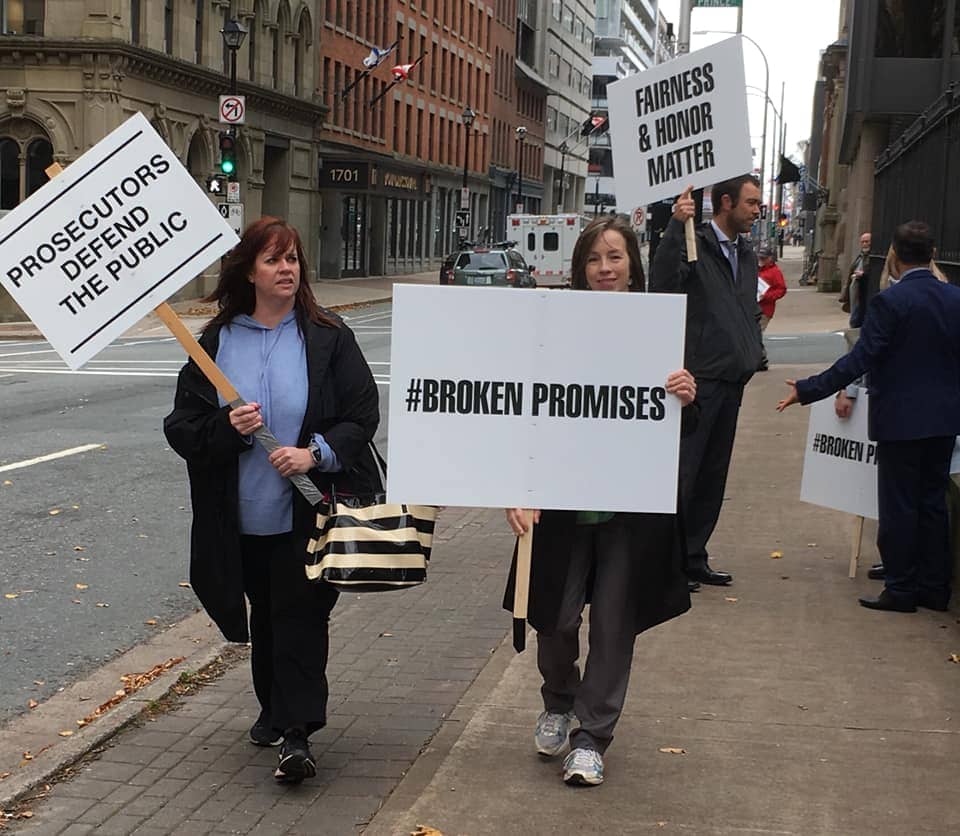
KJIPUKTUK (Halifax) – One hundred Crown attorneys are on strike and are picketing at the Nova Scotia legislature. We have seen this before. In 1998, denied even the right to join a union, the prosecutors went on an illegal strike. Their nervy challenge won them right to arbitration, which prevented strikes for over twenty years.
In 2016, in return for Crowns agreeing to a modest three per cent wage increase over four years, the government agreed to continue arbitration for thirty years
But now the government has ripped up the arbitration agreement and unilaterally replaced that with a bogus “right to strike,” which declares Crowns an “essential service,” and renders any work stoppage ineffective.
The government is now seeking an injunction which would declare current picketing illegal and make any defiance by prosecutors a contempt of court. Then fines and even jail terms could follow. We hope that the Crowns continue to engage in civil disobedience, defy any injunction and challenge the government’s grim tactics.
The irony of the government using the brute force of the law on professionals who enforce the law cannot be lost on anyone.
This is all part of the provincial Liberal government’s cynical and malevolent strategy to deal with labour in general, a strategy they have been employing since the day they assumed office. That strategy is illegal and arguably immoral. But it is temporarily effective. And it revolves around the adage “Justice delayed is justice denied.”
As in all jurisdictions in Canada, Nova Scotia’s government has a dilemma when it comes to workers on the public payroll.
The Supreme Court of Canada has ruled that for workers the right to strike is a fundamental freedom protected under the Charter. Governments can remove the right to strike but only if they replace it with a reasonable alternative dispute resolution process which approaches what could be achieved in free collective bargaining. That alternative is arbitration.
Given the Charter, here’s the dilemma: The government hates both options. They don’t want strikes. And they don’t want arbitration. They want the ability to dictate the terms and conditions of employment, full stop.
And here’s how Nova Scotia’s government is trying to solve that dilemma: They have made it impossible for public sector workers to go on strike effectively. Unions must provide “essential services” at a rate so high that striking is meaningless. That is not a reasonable substitute for the right to strike.
The government’s solution will very likely not withstand a Charter challenge. As we have seen in several provinces so far, including a teacher’s dispute in British Columbia, the eventual court ruling will cost the government and taxpayers more than it was hoping to save by outlawing strikes. But here’s the rub: By the time the court challenges wend their way up the system, years will pass and a different government will have to sort out the mess
Why should we be concerned with a small group of 100 lawyers whose salary starts at $65,000 a year and who are the agents of a legal system that is often so brutal to the lives of the poor, the indigenous, and other marginalized people?
Because if the government can act so high handedly to them, if it can act with impunity toward a relatively privileged group, then it can do it to everyone else.
It’s good to see some group drawing a line in the sand.
Judy Haiven is a retired professor of management at Saint Mary’s University. Larry Haiven is professor emeritus of management at Saint Mary’s University. They are both members of Equity Watch, a nonprofit organization dedicated to workplace rights and are research associates of the Canadian Centre for Policy Alternatives – Nova Scotia.
With a special thanks to our generous donors who make publication of the Nova Scotia Advocate possible.
Subscribe to the Nova Scotia Advocate weekly digest and never miss an article again. It’s free!




Applied for a Crown job. They are always posted and NS seems to be desperate for more. I was willing to take a pay cut to time home, although its the same work as elsewhere in the country and I don’t get why they’re so underpaid.
Anyway I’m not willing to work with this kind of employer treatment. I’ll go with the Feds or the private sector, even if it’s elsewhere, rather than work under those conditions. I’ll make more and fly my parents out more often.
$160k as a twenty year lawyer? That’s about 50% of the private sector. I guess the NS govt doesn’t really care about retaining talent, just throw junior lawyers at murder trials and who cares about the outcome. People seem to forget its 7 years or more to finish law school. A year of gruelling apprenticeship. These people are underpaid working 12hr days putting bad guys away. It’s a shit job, dealing with the worst of society day in and out.
The irony of the premier being the highest paid in the country isnt lost in this dispute. Hell, the minister of Justice and deputy minister likely earn well over $200k and are home by 5 daily.
I feel bad for the DOJ lawyers who are doing this injunction. Their own contract is coming down the pipes and they can now know what to expect. Hopefully they botch the injunction on purpose. I bet they’ve advised MacNeil the legislation is illegal and willl never pass muster, but being a refrigerator repairman he doesn’t give a damn.
Ohwell, 6 years from now taxpayers will be on the hook for way more than 17%. Typical NS to play the short game. Who is ever going to want to work in this province?